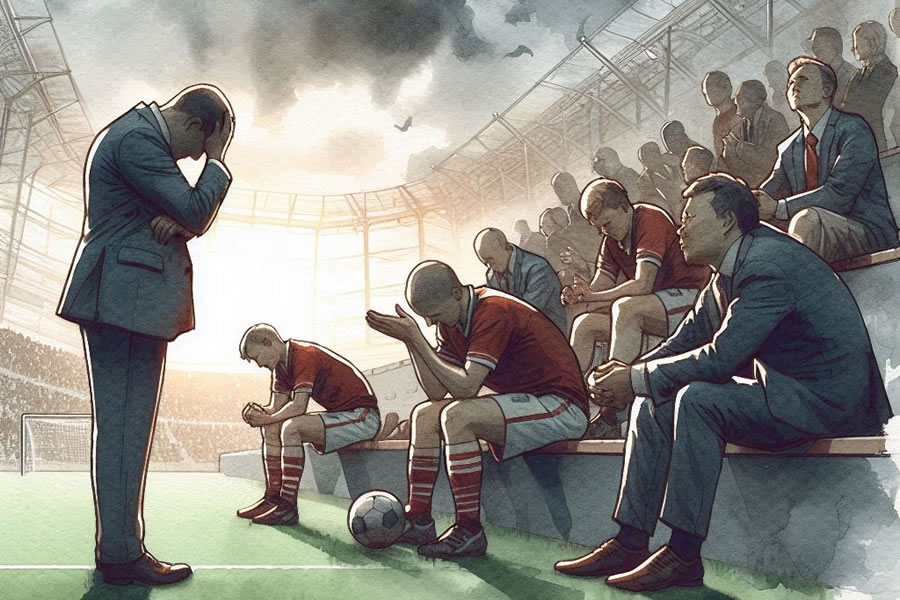Disappointing News
We must accept finite disappointment, but we must never lose infinite hope.
– Martin Luther King, Jr.
Disappointment is just plain…well… disappointing. Unfortunately it’s also a fact of life and there’s no escape because no matter how much we want it, life isn’t a bowl of cherries. Every one of us has desires, wishes and goals and each one of us, in our own way, is doing our best to achieve them. We want to be happy. We want success. We want to feel good about ourselves.
Sometimes our dreams come to fruition and sometimes they don’t. Sometimes bad things happen because of actions we’ve taken…or not taken. More often, however, our disappointments are due to things over which we have no control or things we don’t understand.

Disappointment comes in all guises. It might be a poor job evaluation or terrible test score. Perhaps you didn’t get the job promotion you wanted. Maybe someone broke a promise, snubbed you or selfishly sabotaged your efforts. You may find yourself enmeshed in a troubled relationship, be disappointed in your athletic team or by your or someone else’s health problems.
The word “disappointment” is made up of DIS and APPOINTMENT. DIS means apart or separate and APPOINTMENT means a meeting or date. So, disappointment describes a feeling of dissatisfaction or anguish which is experienced when we are torn apart from our expectations of how things will be in life. That’s why it’s important to understand that the negativity and distress surrounding disappointment does not exist in the real world but only in our mind. It’s not the event itself; it’s our interpretation of the event that causes us grief.
What really matters is whether we perceive disappointments as personal failures – or not. If we do, it is easy to internalize these negative feelings and tip into the danger zone of frustration, anger, depression or worse.
How you deal with these disappointments is what will determine whether you’re in control of your life or simply a victim.
How do you react when you are disappointed? Do you get mad and blame someone else? Do you blame yourself and put yourself down by feeling that you’re not good enough? Do you learn something from the event or are you diminished by it? It all depends where you are focused and what you are focused on.
As the German poet, dramatist, philosopher and historian Friedrich von Schiller wrote, “Disappointments are to the soul what the thunderstorm is to the air.”
Here are some tips to help you cope with disappointment.
- Focus on learning. There is always something to learn from disappointment. When you choose to focus on learning, it makes a huge difference in your confidence level. Maybe you need to prepare better next time or perhaps you just need to learn to let go. You might need to learn to take risks that are well thought out or even welcome disappointments as challenges and a great opportunity to solve a problem.
- Adjust your expectations. The great Canadian endocrinologist Hans Selye said that expectations are the source of all anxiety. How true it is, but what is one to do about it? You can’t eliminate expectations and you don’t always want to lower them. You can discover if you’re setting yourself up for disappointment by having unrealistic expectations of yourself or others and if you do, perhaps you need to lighten up a bit. Remember that all we humans have flaws and we are all imperfect.
- Do a reality check. I find this most helpful for perfectionists because they live in their own made up, imaginary world. They think that life is perfect and therefore they should be perfect. This is a sure-fire way to live your life in disappointment. If you are a perfectionist, use disappointment as the stimulus to come into the reality of the real world and let go of an illusionary perfect world that just doesn’t exist.
- Re-examine your life priorities. Maybe your disappointment is really a message that you are going down the wrong path. Use the negative event as an opportunity to examine where your priorities really lie.
- Do a fear check-up. Fear causes us to do and say some pretty stupid things, and sometimes disappointment is directly related to shooting yourself in the foot. You might want to ask yourself if the fear of rejection, change, success, failure, commitment or poverty created self-sabotaging behavior and if it did, here’s yet another opportunity for you to learn.
- Seek support. Sometimes disappointment can prompt you to shut out both your friends and your family. That is a very dangerous thing to do because by shutting out others you could be sealing off hope and healing. When you are disappointed, seek support. I guarantee you that those closest to you would be honored if your shared your sadness. That doesn’t mean that you complain. It means that you ask for a loving ear.
- Cultivate Patience. The English essayist and poet Joseph Addison (1672-1719) wrote, “Our real blessings often appear to us in the shape of pains, losses and disappointments; but let us have patience and we soon shall see them in their proper figures.”
Follow any or all of these tips and you will never have to let disappointment turn in to deep sadness and depression. You have the ability to use disappointment instead of letting disappointment use you.

James Mapes is the founder of Quantum Leap Thinking™, creator of The Transformational Coach™, expert on the psychology of “applied imagination,” best-selling author, highly acclaimed business speaker, consultant, seminar leader and personal excellence coach.
